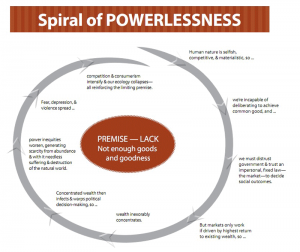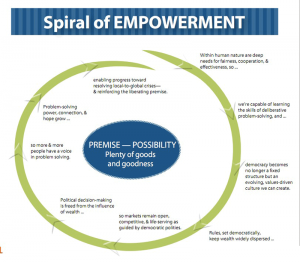A week ago I had the opportunity to hear Frances Moore Lappé speak here in Richmond. She's primarily known around the world as author of Diet for a Small Planet, but she's also an Earlham College graduate, so it was great that she came back to her alma mater to give a talk.
Lappé's talk overall was about how we can move from a place of powerlessness to a place of empowerment when it comes to working on addressing various ills that plague the world - from climate change to energy/resource crises to poverty, and all of the other systems and issues that are related.
It's a topic, a question that's been on my mind lately as I think about my own vocation, and where (to borrow from Frederick Buechner) my talents and interests might meet the world's deep needs. The question wasn't answered for me during the talk, but there were a few insights and random bits of wisdom that I want to preserve here:
Lappé said she's spent a lot of time exploring a question that struck me deeply: why and how is it that we as humanity are collectively creating a world that, as individuals, none of us would choose to create?
In other words, if I would not personally choose to create a world where 21,000 children die every day due to poverty, and presumably no one else on the planet would individually choose to create a world where 21,000 children die every day due to poverty, how is it that 21,000 children die every day due to poverty? (There are intellectual and academic answers to this, of course, but my heart doesn't know of a good answer.)
Lappé also talked about why it can be so hard to have the civic courage to stand up for what we believe in even when it is unpopular or out of place in our surroundings. She noted that human connection is such a source of meaning, joy and glory for us that it is understandably so hard to separate ourselves from the pack, to set ourselves apart from the norms and traditions followed by our friends, families, neighbors and co-workers. It was helpful to me to hear that inertia toward not "rocking the boat" described in terms of the positive social benefits it usually provides for us.
Finally, Lappé shared two models of social/human systems that describe a spiral of powerlessness and an alternative spiral of empowerment, presented in the form of two images. I don't have the actual versions on her slides but I found the below versions from her Small Planet Institute which I think are close enough (click on each for the full size).
These systems are necessarily over-simplifications of how things work and they surely leave some things out, but they are still useful to look at and think about.
 I’m a journalist, publisher, software developer and entrepreneur with experience as a founder and organizational leader. Work with me or learn more about me.
I’m a journalist, publisher, software developer and entrepreneur with experience as a founder and organizational leader. Work with me or learn more about me.


Chris,
I appreciated her as well. The question that I left with is strategy. The two examples she used, women's groups in AP, India (we know something about this) and Mathai Wangari, are both examples of working outside the "system". Wangari was, from what little I know, not a successful MP. The women in India are Dalit, by definition (not legal, but cultural and real). The question is whether to work to adjust the "system" or build the alternative.